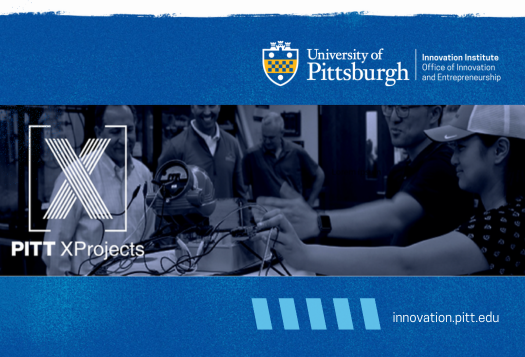
Four innovation projects have been selected to receive funding from the Innovation Institute’s Commercialization Gap Fund to have prototypes of their innovations created in collaboration with the Swanson School of Engineering’s Innovation and Entrepreneurship program.
Xprojects are design and prototyping projects that can accomplish critical early-stage conceptual of proof-of-concept development. The request for proposals for the XProjects funding received more than 30 submissions from across the University.
“We are thrilled to collaborate with the school of engineering to help accelerate Pitt innovations on the path from the lab to the market,” said Peter Allen, Executive Director, Inventor Engagement and New Ventures at the Innovation Institute.
Allen added: “The goal of the Gap Fund is to assist Pitt faculty and students with technologies that have commercial potential in conducting experiments or creating prototypes to de-risk the projects. This can in turn help attract interest from potential strategic partners or investors.”
“The response to the request for proposals for XProjects was amazing,” said William “Buddy” Clark, Professor of Mechanical Engineering and Materials Science at Swanson, and who oversees the maker spaces within Benedum Hall. “We are excited to help bring Pitt innovations from around campus to life.”
Below is a summary of the funded projects. Projects not funded in this round are eligible for future rounds and are being assisted in locating other funding sources.
“Novel Low-Profile Fully Retrievable Foldable Epidural Lead Array (FELLA) System”
Principal Investigators:
Gaurav Chauhan, Assistant Professor, Department of Anesthesiology and Perioperative Medicine
Trent Emerick, Associate Professor, Department of Anesthesiology and Perioperative Medicine
This project is aimed at developing a new spinal cord stimulation device for controlling chronic pain that eliminates the need for a more invasive surgery to insert the stimulator leads. Current implantation techniques may require a surgery known as a laminectomy and a larger incision that can result in a higher risks of complications including bleeding, nerve damage, and spine instability.
“A Novel Human Full Thickness Ski Perfusion Platform for Disease Modeling and Drug Discovery”
Principal Investigator:
Asim Ejaz, Assistant Professor, Department of Plastic Surgery
There currently is no reliable model system having a physiological and anatomical resemblance to human skin that can be used for studying the mechanism of skin related pathologies (radiation/chemical wound/fibrosis, allergies, aging, UV effects, melanoma and other skin cancers) and test therapeutics. Dr. Ejaz has developed a system that utilizes surgical tissues that can be kept viable for up to three weeks or longer.
“Prosthesis-Compatible Vibration Therapy for Phantom Limb Pain”
Principal Investigator:
Goeran Fiedler, Assosicate Professor, Department of Rehabilitation Science and Technology
A majority of people with limb loss suffer from phantom limb sensations or even phantom limb pain. Opioids have shown some effectiveness but come with severe side effects. This project introduces vibration therapy to preoccupy the nerve pathways that would transfer the errant pain signals to the brain, thus preventing the broken feedback loop that is believed to play a role in the dynamics of phantom limb pain episodes.
“ScOAPe- A Self-Cleaning Attachment for Nasal Endoscopes”
Principal Investigators:
Rohit Mantena, student, Pitt School of Medicine
Kamil Nowicki, resident, Department of Neurological Surgery
Adi Mittal, student, Pitt School of Medicine
Michael McDowell, Assistant Professor, Department of Neurological Surgery
A nasal endoscope is a surgical tool with a camera and light at its tip, used during sinus and skull base tumor removal surgeries. During surgery, debris such as blood and mucus accumulates on the lens, blocking the view, which requires removal, cleaning and reinsertion of the lens each time visualization is lost. Dr. Mantena and colleagues are developing, ScOAPe, a self-cleaning endoscope attachment that will decrease surgical time, and therefore money, while reducing surgical errors.
Faculty and students looking for design, engineering, and prototyping assistance can reach out to XPROJECT@pitt.edu. Students interested in working on an XProject can apply when projects are announced the second week of each semester. Learn more at https://www.ssoe-innovation.org/